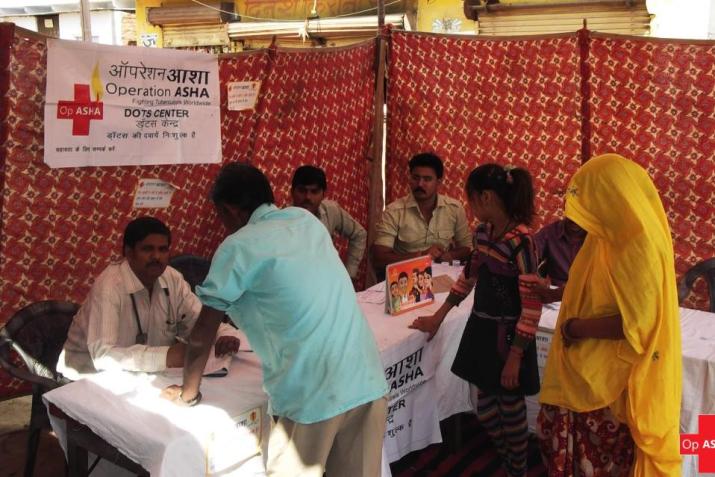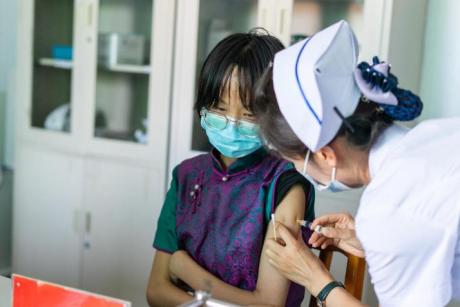
Team from Operation ASHA, one of SEAD's innovators, in Jaipur organizing a health camp. Operation ASHA works to prevent and treat tuberculosis by utilizing SMS and biometric technology.
Published February 16, 2015, last updated on April 19, 2023 under Research News
Healthcare entrepreneurs have a vested interest in demonstrating the beneficial outcomes of their activities and interventions. Not only do they want to improve the lives of people in the communities they serve, but additional funding to support and scale up their programs is often contingent upon evidence that their current efforts have proven effective.
However, traditional best practices for evaluation, such as randomized controlled trials, are typically impractical for entrepreneurs due to the dynamic, business-focused environments in which they operate. Common challenges include the high cost of data collection, the extended time frame needed to observe change, and the difficulty of securing comparison groups or settings to help highlight the impact of the intervention. Therefore, healthcare innovators seek rigorous yet nimble approaches to evaluate the outcomes of their work.
Duke Innovators Are Hungry for Credible but Feasible Evaluation Tools
Funded by USAID, the Social Entrepreneurship Accelerator at Duke (SEAD) aims to engage faculty and students to increase the impact of health entrepreneurs and the broader development community. With a network of healthcare innovators in East Africa and India, SEAD is well-positioned to collaboratively develop and test “innovator-friendly” evaluation methods geared toward providing credible evidence for future business engagement and financing.
To this end, SEAD recently signed an agreement with the Duke Global Health Institute’s Evidence Lab to create, pilot and finalize an evaluation toolkit for health entrepreneurs.
Evidence Lab: Building Capacity for On-the-Ground Evaluation Research
Established in 2014, the Evidence Lab conducts high-quality, objective evaluation using rigorous and innovative research designs and methods, with a focus on evaluation in real-world settings. Working with Duke faculty and entities as well as external partners, they also focus on building capacity in individuals and other organizations to conduct this type of research effectively.
“We’re thrilled to be collaborating with the evaluation experts at DGHI to help our innovators better understand and communicate the impact of their work and, in doing so, enhance their efforts to improve the health of the populations they serve,” said Sarah Gelfand, deputy director of SEAD.
Innovator-Friendly Tools Will Assess Impact on Several Levels
The Evidence Lab will develop and test three new innovator-friendly evaluation tools to support SEAD innovators and to inform future USAID investments in healthcare entrepreneur programs.
Entrepreneurs often want to describe the economic impact of their programs but are not sure what economic aspects of their program to highlight. The first tool, designed to evaluate economic impact, will help innovators understand and use different strategies for evaluating the economic strengths of their innovations, including overviews of costing, cost-benefit analysis and cost-effectiveness analysis.
Many entrepreneurs also want to be able to describe how their program has expanded access to health care or improved the quality of care for their patient populations. The second tool will be a patient intake form that will include questions about prior health care experiences so program staff can better track the impact of their services for individual patients (e.g. initial and continued engagement in primary care services).
And lastly, the Evidence Lab will create a tool to help entrepreneurs—who are often scaling up and expanding their services—to think through the evaluation opportunities that arise when they expand to a new geographic area. This tool will suggest health indicator data to collect before and after starting services in a geographic area, giving specific examples of commonly available health indicator data and how these data may be used to shed light on a program’s impact.
Pilot Feedback Will Guide Final Tool Development
Once these tools are developed, the Evidence Lab will pilot them with three or four SEAD innovators, providing training and technical assistance as needed. Feedback from pilot participants on the usability of the tools will inform the final versions of the tools, which will ultimately be available for broader use.
“We’re delighted to partner with SEAD innovators to create practical, readily usable evaluation tools,” said Evidence Lab director Rae Jean Proeschold-Bell. “Leaders want data documenting their program’s impact, but insufficient time, money, or evaluation expertise can get in the way. We hope to address these challenges by coming up with strategic approaches to evaluation and creating pragmatic how-to guides.”
Learn more about the Evidence Lab’s approach, services and leadership.
Read the DGHI article about the launch of the Evidence Lab in 2014.
To inquire about collaborating on a project, please contact Joy Noel Baumgartner, associate director of the Evidence Lab.


